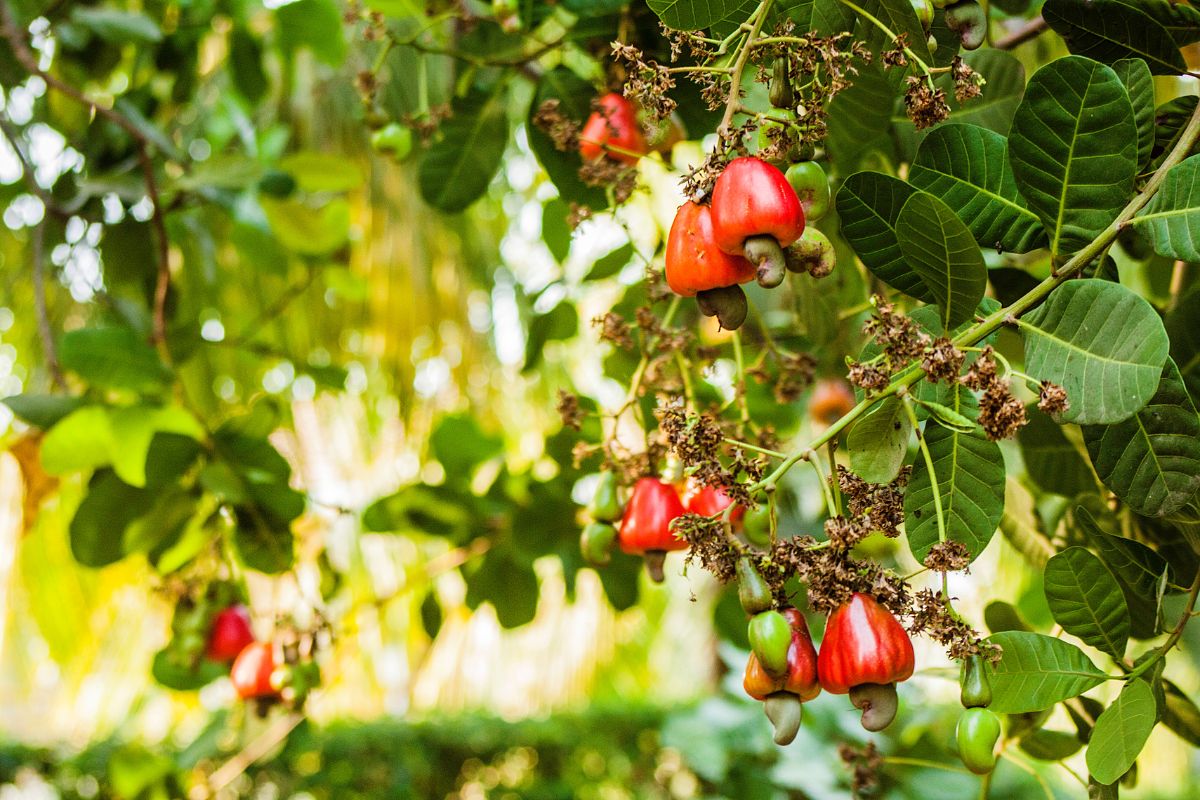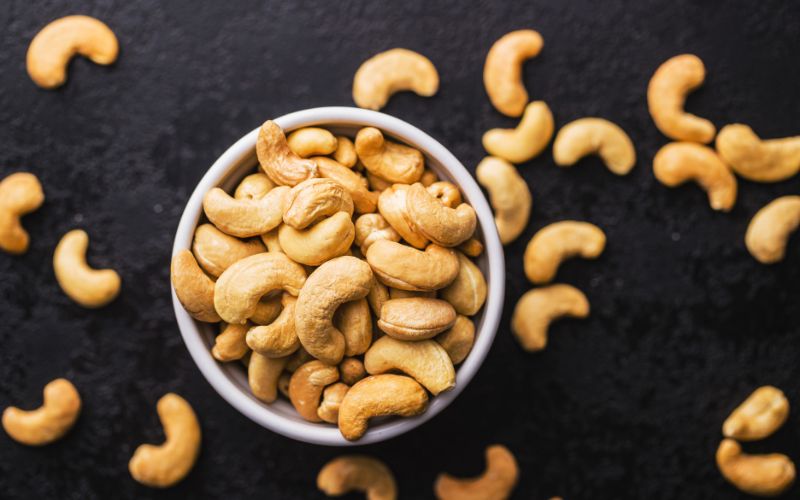Raw Cashew Nuts and Kernels
From West-African origins
Fairtrade & Organic certified
RAW Cashew Nuts
We directly procure raw cashew nuts from farmers in various regions of West Africa. Our dedicated teams located in these regions work closely with local farming communities, enabling a clear understanding of the raw cashew nut quality procured. By fostering partnerships with cooperatives, we effectively provide a reliable flow of raw materials for our customers.
Sourcing
Our cashew sourcing team works directly with producers, farmers and wholesale suppliers in markets throughout West Africa.
transportation
Our ocean freight transportation and warehousing expertise enables us to create efficient trading scenarios for suppliers & buyers in several markets.
supply & distribution
With extensive industry knowledge and networks in origin and destination markets, we are a valuable strategic distribution partner
How We Work. Our Mission & Values
We believe in providing fair compensation to farmers, fostering sustainable farming practices, and promoting a balanced cashew value chain. By ensuring equitable pricing, we contribute to the economic well-being of cashew farmers and the overall development of cashew-producing regions. Transparency and integrity are at the core of our fair value sourcing approach.

Anacardium
Portuguese explorers and traders encountered cashew trees during their expeditions to Brazil in the 16th century. The cashew tree and its products were introduced to other parts of the world and quickly gained in popularity due to their nutritional value and versatility in culinary applications.
How do we assess the quality of cashew nuts?
Our sourcing team performs a “cutting test” for each lot we buy. It involves physically examining the nut to determine its texture, color, and overall condition. We assess different variables such as the outturn (kernel output ratio), moisture, nut count and total defective nuts.
will the ocean transit time damage the quality ?
Maintaining a moisture content below 10 percent when stuffing cashew nuts into containers for ocean transit is crucial for several reasons, primarily related to the preservation of the quality and safety of the nuts during the journey.
We make sure every raw cashew nuts cargo have a low moisture content, so that it arrives at destination in optimal condition, meeting the quality standards expected by customers.
why Raw cashew nuts are stored in polypropylene (PP) bags during transit?
-
Moisture Resistance: PP bags have good moisture resistance properties, helping to protect the cashew nuts from potential exposure to humidity and moisture during transit. This is crucial in preventing mold growth and maintaining the desired moisture content in the cashews.
-
Protection from Contaminants: PP bags act as a protective barrier against contaminants, dust, and other foreign materials that may compromise the quality and safety of the cashew nuts.
-
Durable and Strong: PP bags are durable and can withstand the rigors of transportation, including handling, stacking, and potential impacts during transit. This durability ensures that the packaging remains intact, keeping the cashews safe.
-
Lightweight and Cost-Effective: PP bags are lightweight, which helps in reducing overall transportation costs by keeping the weight of the packaging minimal while still providing adequate protection to the cashews.
-
Ease of Handling and Stacking: PP bags are easy to handle, stack, and load into containers or storage areas, making the packing and shipping processes more efficient.
-
Good Sealing Properties: PP bags can be sealed effectively, providing an airtight or nearly airtight seal to maintain the freshness and quality of the cashews.
-
Transparency and Visibility: Some PP bags are transparent or semi-transparent, allowing for easy visual inspection of the contents, which can be beneficial for both quality control and customs inspections.
-
Compliance with Regulations: The use of PP bags for food products like cashews often aligns with international shipping and safety regulations, ensuring compliance with industry standards.
-
Environmental Considerations: PP bags are recyclable, which aligns with sustainability goals and environmental considerations during transit.
who are the top cashew nut-producing countries?
-
Vietnam: Vietnam is consistently one of the largest cashew nut producers globally. The country has a well-established cashew industry, with significant processing and export capabilities.
-
India: India is another major producer of cashew nuts. It is known for both its production of raw cashew nuts and its processing industry, especially in states like Maharashtra, Kerala, and Karnataka.
-
Ivory Coast (Côte d’Ivoire): Ivory Coast is a prominent cashew nut producer in Africa and a significant contributor to the global cashew industry.
-
Nigeria: Nigeria is a leading cashew nut producer in Africa. The country has a significant cashew production sector, particularly in states like Benue, Kogi, Kwara, and Oyo.
-
Indonesia: Indonesia is a significant producer of cashew nuts, primarily in regions such as East Java, South Sulawesi, and Bali.
-
Brazil: Brazil is one of the major cashew nut producers in the Americas. The northeastern region of the country, particularly in the state of Ceará, is a notable cashew-producing area.
-
Tanzania: Tanzania is a key cashew nut producer in Africa. The southern regions of the country, including Lindi, Mtwara, and Ruvuma, are major cashew-growing areas.
-
Ghana: Ghana is an important cashew nut producer in West Africa. The country’s cashew production has been growing steadily in recent years.
-
Benin: Benin is a notable cashew nut producer in West Africa, and it plays a role in the global cashew market.
-
Mozambique: Mozambique is emerging as a significant cashew nut producer, with a growing industry in various regions of the country.
Other countries with notable cashew nut production include Guinea-Bissau, Guinea, Senegal, Burkina Faso, Tanzania, Cambodia, and Thailand, among others.
It’s important to note that production levels can change over time due to various factors, including weather conditions, market demand, agricultural policies, and economic factors.
what are the main by products of cashew nuts?
-
Cashew Kernel (Nut):
- The cashew kernel is the primary product and the edible part of the cashew nut. It is widely consumed as a snack and is also used in cooking, baking, and various culinary applications.
-
Cashew Shell Liquid (CSL):
- The cashew shell contains a viscous, dark brown, caustic liquid called cashew shell liquid (CSL). It’s a by-product obtained during the shelling or processing of cashew nuts.
- CSL is used in the production of a wide range of products, including resins, paints, varnishes, brake linings, and other industrial applications due to its unique chemical properties.
-
Cashew Nut Shell Cake:
- After extracting cashew shell liquid, the residue left behind is called cashew nut shell cake. It is used as fuel in cashew processing units or as a component in agricultural soil improvement.
-
Cashew Husk and Testa:
- The outer covering of the cashew nut, known as the husk, and the inner thin skin, known as testa, are by-products of cashew processing. These by-products can be used in composting or as organic matter for soil improvement.
-
Cashew Apple Pulp:
- The cashew apple pulp is a by-product obtained after extracting the cashew nut. Although not as commonly used, it can be used to make beverages like juice, wine, or vinegar. It can also be used in the production of animal feed.
-
Cashew Leaf:
- Cashew leaves can be used for various purposes, such as making tea or as fodder for animals.
-
Cashew Shell Residues:
- The remnants or residues left after extracting the cashew shell liquid may be further processed to extract additional components or used for various purposes, including fuel.
Efficient utilization of these by-products is essential to minimize waste and ensure sustainability in the cashew nut processing industry. Additionally, the development of innovative uses for these by-products contributes to a more efficient and sustainable cashew nut industry.
Sourcing, Quality, and Sustainability
Our focus is on providing high-quality agricultural commodities, ensuring a smooth connection between farmers and consumers. We strive to set new benchmarks in the industry, emphasizing reliability and innovation. Our diverse product range is designed to meet your requirements effectively.

